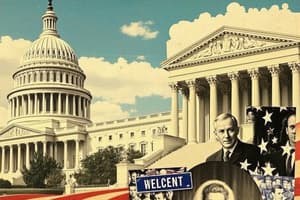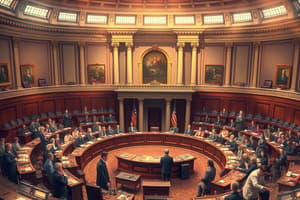Podcast
Questions and Answers
What does the term 'collective action dilemma' refer to?
What does the term 'collective action dilemma' refer to?
- The need for governments to enforce laws.
- The difficulty groups face in working together efficiently. (correct)
- The importance of government spending.
- The benefits of individual decision-making.
According to John Locke, what is the primary reason for the existence of government?
According to John Locke, what is the primary reason for the existence of government?
- To take away personal freedoms.
- To address collective action dilemmas. (correct)
- To enforce equality among citizens.
- To maintain control over the elite.
What is a key characteristic of Majoritarianism?
What is a key characteristic of Majoritarianism?
- Policies are determined by elite groups.
- Decision-making reflects the will of the majority. (correct)
- It supports the suppression of minority rights.
- It values individual rights over group decisions.
What is one likely consequence of too many free riders in a group?
What is one likely consequence of too many free riders in a group?
Which of the following values is NOT considered a major democratic value?
Which of the following values is NOT considered a major democratic value?
What does the Elite Theory in politics suggest?
What does the Elite Theory in politics suggest?
Which philosopher is known for the belief that life in a state of nature is 'nasty, brutish and short'?
Which philosopher is known for the belief that life in a state of nature is 'nasty, brutish and short'?
What does the feedback loop in a democratic system represent?
What does the feedback loop in a democratic system represent?
Flashcards
What is Politics?
What is Politics?
The struggle between different groups for resources. It's about who gets what, when, and how. This process is never random, but rather determined by power dynamics.
What is the Free Rider Problem?
What is the Free Rider Problem?
A situation where individuals or groups can benefit from a shared resource without contributing to its upkeep. For example, everyone using a public park, but no one contributing to its maintenance.
What is Democracy?
What is Democracy?
A system of government where the people hold the power and govern themselves through participation and representation. It originates from the Greek term 'rule by the many'.
Inputs (in Democracy)
Inputs (in Democracy)
Signup and view all the flashcards
Outputs (in Democracy)
Outputs (in Democracy)
Signup and view all the flashcards
Majoritarianism
Majoritarianism
Signup and view all the flashcards
Elite Theory
Elite Theory
Signup and view all the flashcards
Minority Rights
Minority Rights
Signup and view all the flashcards
Study Notes
US Government Overview
- Politics is the struggle to allocate scarce resources; who gets what, when, and how. This isn't random.
- Governments exist for two reasons:
- People have good human nature, so government helps solve collective action dilemmas.
- People have bad human nature, so government is needed to ensure people don't harm each other. (Thomas Hobbes stated life without government is "nasty, brutish, and short")
- A collective action dilemma occurs when groups have problems working together efficiently because some people avoid contributing their fair share. Governments help solve this "free rider problem."
Free Rider Problem
- The free rider problem occurs when individuals benefit from a group's efforts without contributing. Too many free riders can destroy collective goods.
- Examples of the free-rider problem include the problem with the use of a shared microwave, group projects, paying for services that benefit everyone (like roads), etc.
- The examples shown in the slides include "The Dirty Microwave," "The Groupwork Problem," "The Unpaid Toll," and "The Nonvoting Citizen."
Democracy
- Democracy is a governing system where the people govern themselves. The term comes from the Greek word meaning "rule by the many."
- Democracy is a continuum, not an on/off switch, meaning it exists on a spectrum.
- The opposite of democracy exists.
- A system of governance where the people do not have power..
- Democracy works with inputs (from the people), the government, and outputs (laws or policies), with feedback loops.
Theories of Power
- These theories explain who gets what in the political process.
- Majoritarianism: "Who gets what" is determined by the will of the majority.
- Elite Theory: A select group (top officials, military officials, corporations) controls policy outcomes, often differing from the majority's wishes. These groups are interested in preserving their own power.
Major Democratic Values
- Majority Rule
- Minority Rights
- Liberty
- Equality
- Diversity
Studying That Suits You
Use AI to generate personalized quizzes and flashcards to suit your learning preferences.




